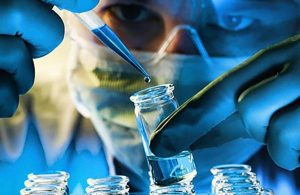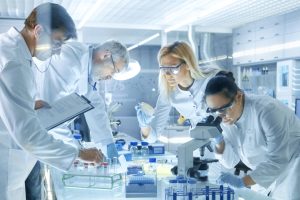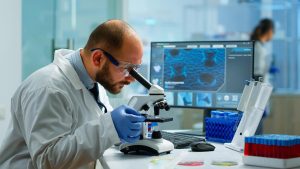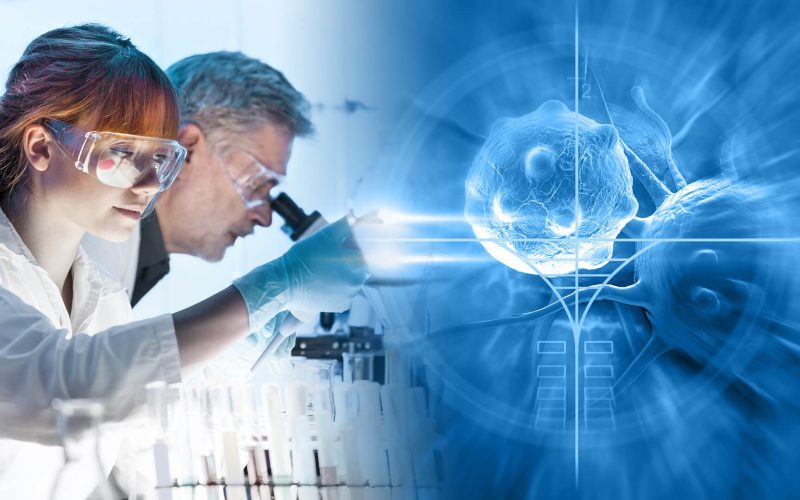Introduction
Biotechnology, the utilization of biological processes for industrial and other purposes, has become a cornerstone of modern medicine. By leveraging the principles of biology, chemistry, and engineering, biotechnology has paved the way for innovative treatments, diagnostics, and preventive measures. This article provides an in-depth analysis of the current state of biotechnology and its pivotal role in medical advancements.
The Evolution of Biotechnology in Medicine

-
Early Milestones
The journey of biotechnology in medicine began with the discovery of antibiotics and the development of vaccines. These early milestones set the stage for more sophisticated biotechnological applications, such as genetic engineering and molecular diagnostics.
-
The Genomic Revolution
The completion of the Human Genome Project in 2003 marked a significant turning point. By mapping the entire human genome, scientists gained unprecedented insights into the genetic basis of diseases, paving the way for personalized medicine and targeted therapies.
Breakthroughs in Biotechnology Driving Medical Advancements

-
Genetic Engineering and CRISPR
One of the most groundbreaking advancements in biotechnology is the CRISPR-Cas9 gene-editing technology. This revolutionary tool allows for precise modifications to DNA, offering the potential to correct genetic defects, treat various diseases, and even prevent hereditary conditions.
Applications in Medicine
Cancer Therapy: CRISPR is being used to develop novel cancer treatments by targeting and modifying specific genes involved in tumor growth.
2. Genetic Disorders: Conditions such as cystic fibrosis and sickle cell anemia are being addressed through gene-editing techniques, offering hope for permanent cures.
3. Infectious Diseases: CRISPR-based diagnostics and treatments are being explored for viral infections, including HIV and COVID-19. -
Regenerative Medicine and Stem Cell Therapy
Regenerative medicine, particularly stem cell therapy, has emerged as a promising field within biotechnology. Stem cells have the unique ability to differentiate into various cell types, making them invaluable for repairing damaged tissues and organs.
Applications in Medicine
Tissue Engineering: The development of bioengineered tissues and organs holds the potential to address the shortage of donor organs and improve transplant outcomes.
2. Neurological Disorders: Stem cell therapy is being investigated for treating conditions such as Parkinson’s disease, spinal cord injuries, and stroke.
3. Cardiovascular Diseases: Regenerative approaches are being explored to repair heart tissue damaged by myocardial infarction and other cardiovascular conditions. -
Biopharmaceuticals
The advent of biopharmaceuticals, or biologics, has revolutionized the treatment landscape for various chronic and life-threatening diseases. These complex molecules, derived from living organisms, offer targeted and effective therapeutic options.
Applications in Medicine
Monoclonal Antibodies: Used in the treatment of cancers, autoimmune diseases, and infectious diseases, monoclonal antibodies provide highly specific targeting of disease-causing agents.
2. Recombinant Proteins: Insulin, growth hormones, and clotting factors produced through recombinant DNA technology have transformed the management of diabetes, growth disorders, and hemophilia.
3. Vaccines: Advances in biotechnology have led to the development of novel vaccines, including mRNA vaccines for COVID-19, which have demonstrated high efficacy and rapid production timelines. -
Personalized Medicine
Personalized medicine, also known as precision medicine, tailors medical treatment to the individual characteristics of each patient. This approach is made possible by advances in genomics, proteomics, and bioinformatics.
Applications in Medicine
Pharmacogenomics: By understanding the genetic factors that influence drug response, healthcare providers can optimize drug selection and dosing for individual patients, minimizing adverse effects and improving therapeutic outcomes.
2. Targeted Therapies: Personalized medicine enables the development of targeted therapies that specifically address the molecular mechanisms underlying a patient’s disease, leading to more effective and less toxic treatments.
3. Predictive Medicine: Genetic screening and risk assessment tools allow for the early identification of individuals at risk for certain diseases, enabling proactive measures and preventive interventions.
The Role of Biotechnology in Diagnostics

-
Molecular Diagnostics
Molecular diagnostics have revolutionized the field of medical diagnostics by providing highly sensitive and specific tests for detecting genetic, infectious, and oncological conditions.
Applications in Medicine
Polymerase Chain Reaction (PCR): PCR-based tests are widely used for detecting infectious agents, genetic mutations, and cancer biomarkers.
2. Next-Generation Sequencing (NGS): NGS technologies enable comprehensive genomic profiling, facilitating the diagnosis and management of complex diseases.
3. Liquid Biopsies: Non-invasive tests that analyze circulating tumor DNA (ctDNA) and other biomarkers in blood samples offer a promising approach for early cancer detection and monitoring. -
Point-of-Care Testing
Advances in biotechnology have led to the development of portable and user-friendly diagnostic devices that provide rapid and accurate results at the point of care.
Applications in Medicine
Infectious Disease Testing: Point-of-care tests for diseases such as HIV, malaria, and COVID-19 enable timely diagnosis and treatment, particularly in resource-limited settings.
2. Chronic Disease Management: Devices for monitoring blood glucose, cholesterol, and other biomarkers support the ongoing management of chronic conditions such as diabetes and cardiovascular diseases.
3. Home Testing: The availability of home testing kits for various health conditions empowers individuals to take control of their health and seek medical advice when necessary.
Ethical and Regulatory Considerations

-
Ethical Challenges
The rapid advancements in biotechnology raise important ethical questions related to genetic privacy, consent, and the potential for unintended consequences.
Key Issues
Genetic Privacy: The collection and storage of genetic information necessitate robust measures to protect individuals’ privacy and prevent misuse.
2. Informed Consent: Ensuring that patients fully understand the implications of genetic testing and gene-editing procedures is critical for ethical medical practice.
3. Equity and Access: Addressing disparities in access to biotechnological innovations is essential to prevent widening health inequities. -
Regulatory Frameworks
Effective regulation is crucial to ensure the safety, efficacy, and ethical use of biotechnological products and procedures.
Key Considerations
Safety and Efficacy: Rigorous testing and evaluation processes are necessary to establish the safety and efficacy of new biotechnological therapies and diagnostics.
2. Quality Control: Standardized manufacturing and quality control practices are essential to ensure the consistency and reliability of biopharmaceutical products.
3. Post-Market Surveillance: Ongoing monitoring of biotechnological products after they enter the market is important to identify and address any emerging safety concerns.
The Future of Biotechnology in Medicine
-
Emerging Technologies
Several emerging technologies hold the potential to further revolutionize the field of biotechnology and drive medical advancements.
Key Innovations
Artificial Intelligence (AI): AI and machine learning algorithms are being integrated into biotechnological research and clinical practice to enhance data analysis, drug discovery, and personalized treatment planning.
2. Nanotechnology: The application of nanotechnology in medicine offers innovative approaches for drug delivery, imaging, and diagnostics.
3. Synthetic Biology: The design and construction of new biological parts, devices, and systems through synthetic biology have the potential to create novel therapeutic and diagnostic solutions. -
Collaborative Efforts
Collaboration between researchers, healthcare providers, regulatory agencies, and industry stakeholders is essential to harness the full potential of biotechnology for medical advancements.
Key Strategies
Interdisciplinary Research: Promoting interdisciplinary research initiatives that integrate expertise from biology, engineering, computer science, and other fields can drive innovation and accelerate medical breakthroughs.
2. Public-Private Partnerships: Collaborative efforts between public institutions and private companies can facilitate the translation of biotechnological discoveries into practical medical applications.
3. Global Cooperation: International collaboration and knowledge-sharing are crucial to address global health challenges and ensure equitable access to biotechnological innovations.
Conclusion
Biotechnology has emerged as a powerful driver of medical advancements, offering new hope for the diagnosis, treatment, and prevention of a wide range of diseases. The continued evolution of biotechnological tools and techniques holds the promise of transforming healthcare and improving patient outcomes. As we navigate the ethical and regulatory challenges associated with these advancements, it is essential to foster collaboration and innovation to realize the full potential of biotechnology in medicine.










